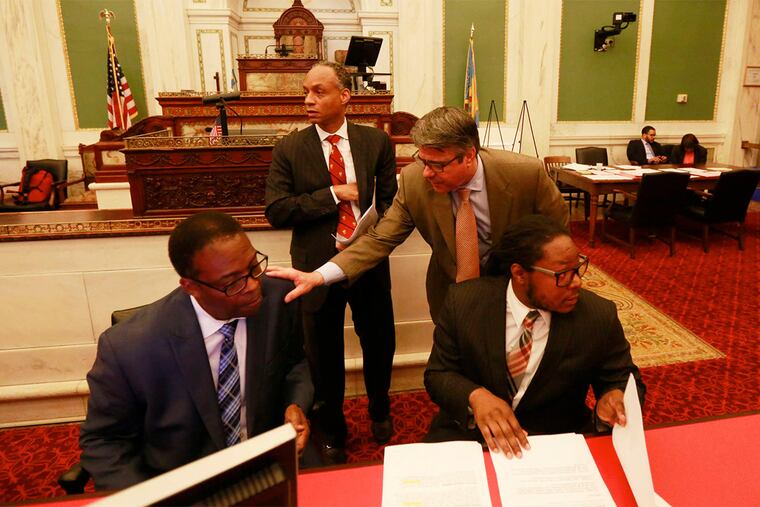Tea leaves in the soda tax vote: Darrell Clarke's grip on City Council loosens
The word went out loudly when the votes were cast: Philadelphia's tax on sweetened drinks made history as the first of its kind enacted by a major U.S. city.

The word went out loudly when the votes were cast: Philadelphia's tax on sweetened drinks made history as the first of its kind enacted by a major U.S. city.
But the vote also was extraordinary in a quieter way - a rare example of City Council navigating a contentious issue without Council President Darrell L. Clarke squarely behind the wheel.
Instead, new Council members formed their own allegiances. Old members strengthened their bonds with outsiders and with Mayor Kenney. And Clarke, it seemed to many in City Hall, wound up in the backseat, voting for a tax he has always professed to hate after seeing it could pass without his support.
"He did not have total and complete control over that process the entire time," political consultant Mark Nevins said. "Whereas normally he does - to his credit."
The 13-4 vote is the latest sign of a shift afoot on Council, six months after Kenney took office and five new members joined the ranks of the 17-member body.
It would be premature to call it the political downfall of the Council president, who in recent years has seen his members largely defer to his leadership and who has held huge sway over the fate of mayoral proposals. On the soda tax, Clarke mostly kept to his playbook - difficult to read, slow to show his cards, intent on getting Council as close to consensus as possible.
Yet things are changing around the North Philadelphia Democrat. And it is clear the allegiances on Council are more fluid than they have been in years, leaving questions about where votes will fall on the next major initiative and whether Clarke's once-solid grip is slipping.
At the core of the shift is something insiders had suspected and that proved true - Kenney has a better relationship with Council than former Mayor Michael Nutter did, and that relationship matters. In the case of the 1.5-cent-per-ounce soda tax, the proof was in the votes - some from members who signed on early, others earned as the mayor and his staff persistently courted those on the fence.
New members were key
Council's new members lacked a predisposition to line up behind Clarke and proved a critical part of the equation.
Take Councilman Allan Domb, a real estate mogul and millionaire with no political ties who became an eleventh-hour swing vote for Kenney. Or Councilwoman Helen Gym, a schools activist who, like Kenney, won office with backing from the teachers' union and was an early "aye" vote in the mayor's column.
There have also been shifts among Council's older members, some of whom, in the start of their second or third terms on a body with no term limits, are still relatively fresh to the job.
Councilman Curtis Jones Jr. positioned himself squarely with the mayor, pushing behind the scenes for the soda tax from day one. Many say that was a smart political move for Jones, who lost his job as Council majority leader in January and whose relationship with Clarke has been on the rocks for months.
Bobby Henon, who took over as majority leader from Jones, made his commitment to Kenney clear. While not unexpected - Kenney and Henon both are confidants of electricians union leader John Dougherty - the bond is still significant and perhaps a sign of Dougherty's growing power in City Hall.
Other members seemed to cast votes for the soda tax with less enthusiasm, leaving questions about where their votes will fall in the future.
Councilwoman Cindy Bass, who supported the tax only after an alternative she raised fell short, could be looking for a new coalition to call home. Her political family, that of longtime U.S. Rep. Chaka Fattah, is in shambles after the Philadelphia Democrat's conviction on corruption charges caused him to resign last week.
Fattah's other allies on Council are Jones, who these days is looking chummy with Kenney, and Councilwoman Blondell Reynolds Brown, who aligned with Clarke during soda tax negotiations.
Different views of future
The question ringing in City Hall is what this all means for Clarke.
Since the vote on the soda tax, the Council president has fought back against the perception that he was pulled along unwillingly. His spokeswoman, Jane Roh, has said he was actually the one who brokered support for the 1.5-cent rate when Council was in final negotiations.
Others see Clarke as trying to claim a win on the soda tax where, at best, he got a draw.
That is an unfamiliar place for Clarke, who during the Nutter administration almost always came out on top.
It is also the second sin in the last six months of turbulence for the Council president, the first coming during the majority leader's race - when he was unable to draw support for his closest Council ally, Bill Greenlee.
Those who say the tides are turning for the Council president are also quick to say counting him out would be both overstating the importance of the soda tax, which gained traction for many reasons, and underestimating Clarke's political savvy.
Some parts of the equation, though, are out of Clarke's control.
"It's possible," one City Hall insider said, "we saw peak Darrell Clarke during the Nutter administration."
215-854-2730
@TriciaNadolny